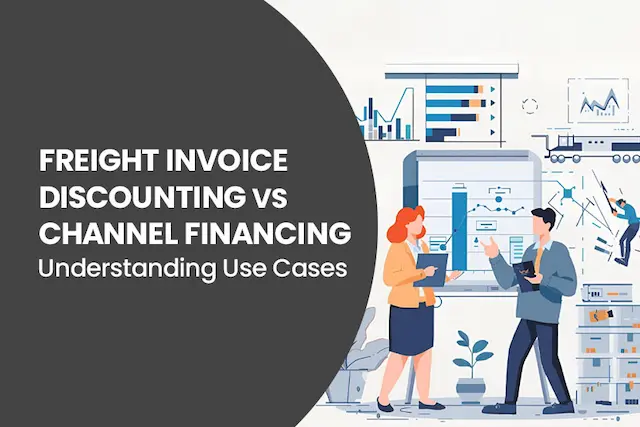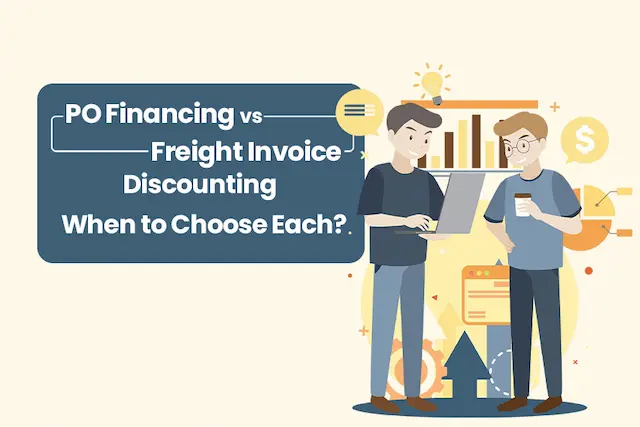If you are a business owner, there are 99% chances that you’ve spent a considerable amount of time researching finance sources that can save you from a funding crunch. Why? At some point or another, your business will need financial help, be it during the start-up, to grow, to expand, to market, or for anything else.
It doesn’t matter how successfully your operations are running; keeping a check on your cash flow is very important. When funds crunch, you need cash immediately, and that can become an issue. What do you do at this point? Bank loans and invoice financing are two popular options that provide a safe escape for business owners.
Both of these different options are successful as well as tricky at some point. There are multiple options to consider before you avail yourself of any of them. You must be wondering which one is a better option, right? This article will take you through your question to help you make an informed choice.
Also Read: The Ultimate Guide on What is Invoice Discounting
Understand Invoice Discounting and Its Pros and Cons
Invoice Discounting, also known as Invoice Financing, is a kind of short-term financing method. In this method, the business takes a short-term loan against its unsettled invoices from a reputable financial institution. The financial institution charges anywhere between 1% and 3% of the total invoice value as the discounting fee. When the invoice matures, the business collects the payment from its client and repays the loan amount to the financial institution.
Pros and Cons Of Invoice Financing
For a better understanding, it’s vital to understand what are the pros and cons of availing invoice financing for business.
Invoice Financing Pros
Improved Cash Flow: Invoice financing helps you set free the tied funds stuck in unselected finances on an immediate basis. It helps you maintain good cash flow to carry out your business operations without any major hindrances.
Quick Access To Funds: When compared with traditional funding options like loan, getting funds through Invoice Financing is much quicker. There’s no loan application of hefty formalities included.
No Debt Incurred: Breaking a myth to many, Invoice Discounting is not a loan. Rather, it’s advanced money that you have already earned. Therefore, when you opt for Invoice Financing, no additional debt burden
Flexible Financing: The amount of financing available increases with the number and value of outstanding invoices, offering more flexibility to meet varying cash flow needs.
No Collateral Required: The invoice financing method only requires the receiver’s creditworthiness and no collateral. It makes it easy to get immediate funds to carry on operations.
Boost Business Growth: Easy access to capital makes it convenient for businesses to focus more on growth and expansion and fulfill new projects with confidence.
Credit Risk Reduction: Some invoice financing providers offer credit insurance, protecting businesses from potential losses if customers default on payments.
Secured Equity: Invoice Financing doesn’t involve giving up on your business equity to acquire funds. It means the business can continue with its business operations without any third-party involvement.
Accessible to Small Businesses: Even businesses with limited credit history or startups can access invoice financing based on the creditworthiness of their clients.
Invoice Financing Cons
Cost: To avail of Invoice Discounting, the receiver has to pay discount rates and service charges. It adds to the overall cost of invoice financing.
Customer Reliance: Invoice Financing heavily depends on the creditworthiness of the business’s customers. It can further limit options for the company with customers that have poor credit histories.
Can Hamper Customer Relations: Involving a third-party financing company may impact the relationship between the business and its customers.
Not Suitable For Everyone: Industries having long repayment terms or customers with poor payment histories might find it difficult to make the most of Invoice Discounting.
Repayment Obligation: Even if the customer delays the invoice payment settlement, the business is still reliable to settle the payment with the financial institution, which leaves the cash flow issues at the same point.
Confidentiality Concerns: Some businesses may be hesitant to disclose their financing arrangements, as invoice financing is contingent on customer payment behavior.
Less Profit Margin: As businesses have to incur discount rates and service charges against the invoices, it brings down the profit margin.
Understand The Traditional Bank Loan and Its Pros and Cons
A bank loan is the most widely used financing method that most people trust and are likely to go with. There are so many types of bank loans available differentiated on the basis of term and collateral requirements. Based on the cost, businesses can opt for the loan.
Pros and Cons Of Bank Loans
For a better understanding, it’s vital to understand what are the pros and cons of availing bank loans for business.
Bank Loans Pros
Capital Injection: Bank loans give a good amount of money that enables businesses to expand, take on new projects, buy assets, and do other things that lead to growth and success.
Flexibility in Usage: Borrowed capital can be used for multiple purposes like inventory management, marketing campaigns, and technology upgrades.
Good Business Credit: Timely payments of loans build a good credit record of the business that makes it easy for the business to borrow funds easily in the future.
Retain Ownership: Like Invoice Financing, bank loans do not require giving up ownership or control of the company. No third-party involvement in your business operations.
Predictable Payments: Bank loans include fixed loan terms, making it easier to plan and make financial decisions.
Tax Benefits: The interest that is paid on bank loans is most of the time tax-deductible. It reduces the tax burden for the company.
Longer Repayment Terms: Business loans usually provide a longer window to pay the amount back. It means a reduced strain on cash flow for the business.
Improved Cash Flow Management: Securing a loan can help businesses manage seasonal fluctuations or bridge gaps in cash flow.
Bank Loans Cons
Interest Costs: Bank loans include interest charges that add to the entire cost of taking a bank loan.
Risk of Default: If the business is going through some financial issues and fails to repay the loan, it might land the business in legal trouble while also damaging the company’s credit score.
Collateral Requirements: Some bank loans might ask for collateral like assets or property. In the event of any default, it can be seized.
Lengthy Process: Unlike invoice discounting, bank loans can be a lengthy process, including documentation.
Impact on Cash Flow: Monthly loan payments can strain cash flow, particularly if revenues fluctuate or there are unexpected expenses.
Market Fluctuations: Interest rates can vary and increase based on what the market rate and situation is. This uncertainty can impact loan repayment and your financial planning.
Opportunity Cost: Taking bank loans could mean diverting your valuable resources towards loan repayment instead of other potential investments or opportunities.
Qualification Criteria: Banks follow strict eligibility criteria that make it difficult for startups and businesses with weaker finances to qualify and take a loan.
Limited Loan Amounts: Banks may not lend the full amount needed, leading businesses to seek additional sources of financing.
Invoice Discounting or Bank Loans? Which One is Better?
After weighing the pros and cons to clarify which one of the two is better, we recommend invoice discounting to our readers. Though it’s a personal choice depending on your fund needs, Invoice Discounting doesn’t involve much liability. Thus, it doesn’t add to the company’s debt on the balance sheet. Unlike bank loans, invoice discounting is fast and hassle-free, involving no strict rules like collateral.
On the other hand, you need to keep something as collateral to get bank loans, along with high-interest rates. Thus, invoice discounting makes for a suitable choice from a reputable company like Credlix.
Credlix offers efficient and reliable Invoice Financing services to businesses looking to manage their cash flow. With a user-friendly platform, Credlix helps companies get immediate funds by converting outstanding invoices into working capital. By leveraging this service, businesses can improve liquidity, seize growth opportunities, and navigate financial challenges without incurring additional debt. Credlix’s streamlined process and credit risk management ensure a hassle-free experience, making it an excellent choice for businesses looking to strengthen their financial stability.
To Conclude
When it comes to deciding between Invoice Discounting and Bank Loans, each option has its own set of pros and cons for businesses. Invoice Discounting offers improved cash flow, quick access to funds, and no additional debt burden, making it an attractive choice for many. On the other hand, Bank Loans provide capital injection, flexibility in usage, and potential tax benefits.
Ultimately, the right choice depends on a business’s specific needs, financial situation, and risk appetite. Considering reputable options like Credlix for Invoice Financing can further enhance a business’s financial stability and growth prospects.




